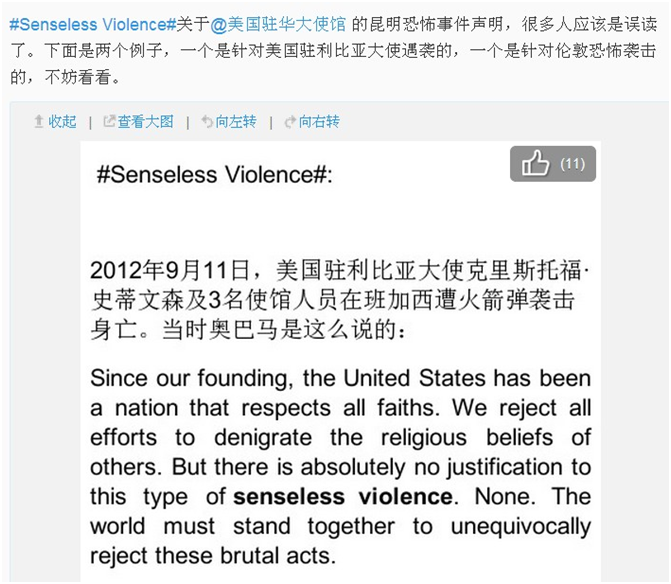Get rid of the senseless “senseless violence”

It’s said that English as a language of the scientifically and technologically more developed world is more logical and accurate than Chinese. But I always argue that it’s not the languages but the people who use them that make them appear so. Actually, languages are by definition not so logical and accurate as some people seem to think. They are used by people and illogical and inaccurate things can very easily happen, even to a great writer and an experienced translator.
Let’s take a look at an excerpt from Conan Doyle’s The Hound of the Baskervilles. In the beginning of Chapter 11 “The Man on the Tor”, it reads:
I start them from the day which succeeded that upon which I had established two facts of great importance, the one that Mrs. Laura Lyons of Coombe Tracey had written to Sir Charles Baskerville and made an appointment with him at the very place and hour that he met his death, the other that the lurking man upon the moor was to be found among the stone huts upon the hillside.
The part in bold type means that Mrs. Laura Lyons made arrangements for meeting Sir Charles Baskerville on a day that happened to be or was made to coincide witha fateful one. It did not imply that he or she was in any way aware of his horrible end. However, in a translation by Li Jiazhen 李家真, the translator seems to say that the bone-chilling murder was also part of the arrangements by the innocent Lyons and the two people were both aware of it, which are of course not the case:
在前一天我了解到两个非常重要的事实,一个是库姆比崔西的劳拉·莱昂斯太太曾经给查尔斯·巴斯克维尔爵士写过信,并约定在他死去的那个地点和时间相见;另一个就是潜藏在沼地里的那个人,可以在山坡上的石头房子中找到。
This is a little confusing for readers of Holmes’s stories who are generally good at reading between the lines. Confusion will not occur if the translation is changed to:
……并约好见面的地点和时间,与查尔斯·巴斯克维尔爵士的死亡地点和时间恰好吻合……
If this is a translator’s pardonable mistake, Conan Doyle as a writer has his own share of contribution to the illogicality and inaccuracy of language. In The Adventure of Wisteria Lodge, he wrote:
“This is very painful–very painful and terrible,” said Mr. Scott Eccles in a querulous voice, “but it is really uncommonly hard upon me. I had nothing to do with my host going off upon a nocturnal excursion and meeting so sad an end. How do I come to be mixed up with the case?”
“Very simply, sir,” Inspector Baynes answered. “The only document found in the pocket of the deceased was a letter from you saying that you would be with him on the night of his [Mr. Aloysius Garcia] death. It was the envelope of this letter which gave us the dead man’s name and address. It was after nine this morning when we reached his house and found neither you nor anyone else inside it. I wired to Mr. Gregson to run you down in London while I examined Wisteria Lodge. Then I came into town, joined Mr. Gregson, and here we are.”
Of course, the letter did not say “the night of Garcia’s death” and only said that Scott Eccles would be with him “on that night”.
My observations here seem arguably nitpicking, but it certainly points to people’s tendency to use languages not so logically and accurately.
Another example was the recent response of the U.S. embassy to China to the atrocities committed on the night of March 1, 2014 in Kunming, Yunnan by some well-trained, knife-wielding, and uniformed Uighur terrorists in black from China’s Xinjiang region.
The original text in Chinese is reproduced here:
美国谴责这一可怕且毫无意义的在昆明的暴力行为。我们向死难者的家人表示哀悼,并向所有被这场悲剧殃及的人们致以慰问。
The first sentence (in bold above) caused uproar and strong protests among visitors to the embassy’s Sina Weibo page.
It’s insulting for many of them to find the U.S. embassy still calculating whether the atrocities have 意义 when they’ve already found the indiscriminate killings so ugly and bloody. The embassy seems to say that there is alternatively sensible and legitimate violence that could have happened to the defenseless civilians. What makes it worse is that the embassy conspicuously shows its unwillingness to call the violence acts of terrorism. This angers the visitors who have good reasons to think the U.S. government has all along condoned and subsidized the terrorist and separatist groups in Xinjiang and Tibet.
The first sentence of the Embassy’s post should obviously be a (badly done) translation from something that reads like this:
The United States condemns this horrible and senseless violence in Kunming.
Not surprisingly, another translator was quick to notice that the American president himself with his Administration uses “senseless violence” to describe the killings suffered by his own people and his Western allies. Nile Gardiner, a Washington-based foreign affairs analyst and political commentator, thinks that the President, in the belief that terrorism is now a “diminishing threat”, hesitates to call them acts of terrorism.
The translator said:
#Senseless Violence#关于@美国驻华大使馆 的昆明恐怖事件声明,很多人应该是误读了。下面是两个例子,一个是针对美国驻利比亚大使遇袭的,一个是针对伦敦恐怖袭击的,不妨看看。
“Since our founding, the United States has been a nation that respects all faiths. We reject all efforts to denigrate the religious beliefs of others. But there is absolutely no justification to this type of senseless violence. None. The world must stand together to unequivocally reject these brutal acts.” – Remarks by the President on the Deaths of U.S. Embassy Staff in Libya
“The United States condemns today’s attack in the Woolwich district of London. We stand with our UK allies in the face of such senseless violence. Our thoughts and condolence are with the family of the victim and the British people.” – Statement by Patrick Ventrell, acting deputy spokesperson
… and said:
关于#senseless violence#,对于不理解的人,你们永远有不理解的理由。的确,我举的例子是公职人员和军人,让你感到偏颇。现在再给一个例子:在2012桑迪胡克小学26人遇难枪击案(20名儿童,6名教职人员)中,白宫用的也是『horrific, senseless violence』,链接第二段,自己看:http://t.cn/8Fdgfuy
“It’s been 33 days since the nation’s heart was broken by the horrific, senseless violence that took place at Sandy Hook Elementary School — 20 — 20 beautiful first-graders gunned down in a place that’s supposed to be their second sanctuary. Six members of the staff killed trying to save those children. It’s literally been hard for the nation to comprehend, hard for the nation to fathom.” – Remarks by the President and the Vice President on Gun Violence
But even the U.S. government’s sanction of this expression is not a surefire guarantee that everyone is eager to buy it, as Gardiner makes it clear. And Jed Lewison wonders where the President picked up such a “disgusting and offensive” expression and seems to have traced the origin:
It’s simply unacceptable for an American president to describe things like genocide or terrorist attacks on diplomats as “senseless violence.” We need to get to the bottom of this, and quickly. We need to know where President Obama learned this disgusting and offensive rhetoric so we can put an end to it. Fortunately, Google has our answer: President Obama’s thought crime was inspired by some guy named Ronald Reagan.
“Those who perished as a result of Nazi terror, millions of individual men and women and children whose lives were taken so senselessly, must never be forgotten.” —Ronald Reagan, February 2, 1983
The intended meaning of “senseless violence” is and its soundness builds on the premise that no violence is sensible. But the interpreted meaning of “senseless violence” can be that there is another category of violence that does make sense. A sensitive brain can easily make of the expression in this way and the ones in China are not alone.
Pat Archbold, who introduces himself at his blog as co-founder of Creative Minority Report, a Catholic website, said:
When I hear these phrases “senseless violence” and “senseless tragedy” I immediately think of circumstances in which they might be appropriate. When a tornado devastates a small Midwest town calling it a “senseless tragedy” seems appropriate. Likewise, when some person with obvious mental illness opens indiscriminate fire on an unsuspecting crowd, calling the act “senseless violence” seems appropriate as the culprit who perpetrated the violence had no logical end.
That is the crux of it, I think. When death ensues from something indiscriminate, whether tornado or mental illness, it can properly be called senseless. It is something that cannot be helped. These things just happen and we cannot make sense of them.
However, when violence is planned and or committed with a specific purpose in mind, it is the exact opposite of senseless and to pretend otherwise is reckless.
A rudimentary entry of Wikipedia’s about “senseless violence” traces the origin of the expression and also takes note of its controversial use:
The term is often criticized because it seems to say that the violence which is not categorized as senseless is legitimate. Also, it is difficult, if not impossible, to define what constitutes “senseless violence”. Others point out that the term is or can be misused by right wing politicians who strive for more repressive measures against crimes.
These examples are revealing about the ambiguous nature of human languages and we can be very sure that there are many.
______________________________________________
Screenshots referred to above:
1. The U.S. Embassy’s post:

2. Comments by visitors (1/2)

3. Comments by visitors (2/2)

4. Posts by the translator (1/2)

5. Posts by the translator (2/2)
